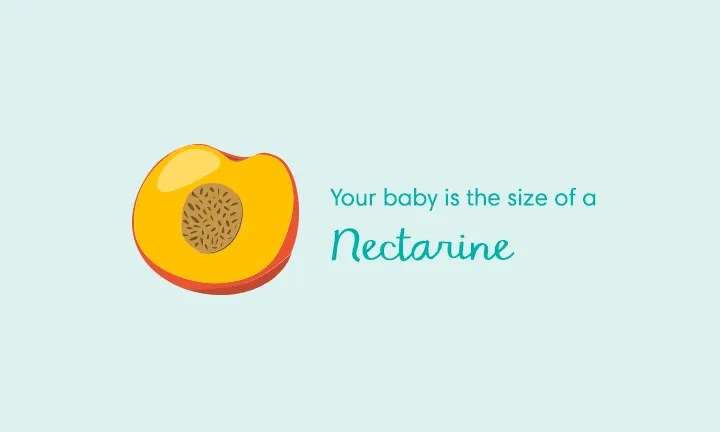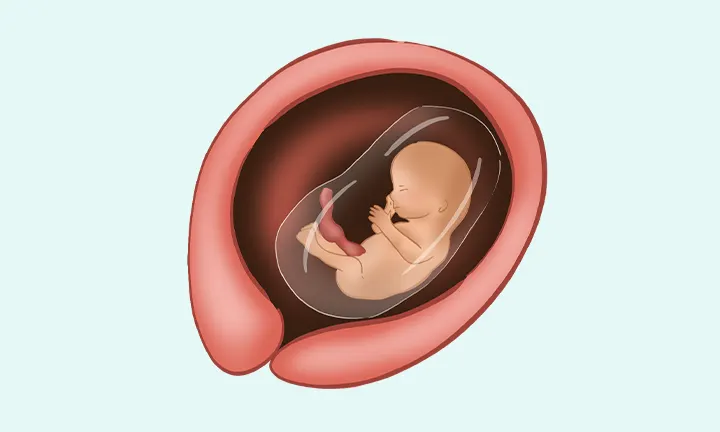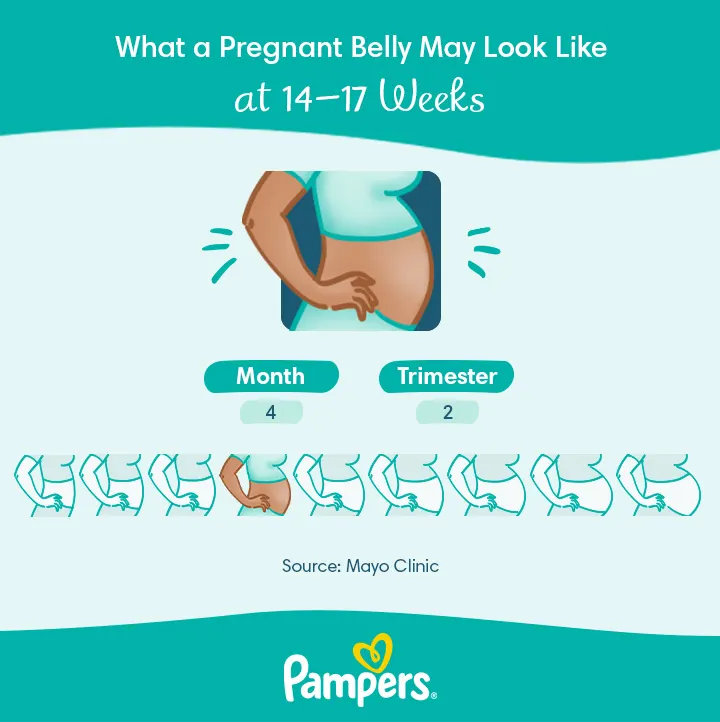14 Weeks Pregnant
At 14 weeks pregnant, you’ve made it to the second trimester! Often called the “golden” period of pregnancy, the second trimester may bring some relief to those uncomfortable pregnancy symptoms such as morning sickness and fatigue, giving you a much-needed boost of energy at 14 weeks and onwards! We’ve got more information about what happens at 14 weeks pregnant, including the signs and symptoms you may experience and the development of your growing baby.
Highlights at 14 Weeks Pregnant
Here are some highlights to look forward to during week 14 of your pregnancy:
Your baby is moving their arms and legs and is developing their senses of smell and taste.
Your little one is beginning to look more and more like the person you’ll meet after birth.
You may have increased energy and more lustrous hair during this trimester.
Your baby bump might be showing now or in the coming weeks, so how about snapping some pictures of your belly at 14 weeks pregnant and over the coming weeks to see those changes in action!
At 14 weeks it’s likely too early to discover your baby’s gender, but you can still have fun guessing with our Chinese Gender Predictor:
Pregnancy Weight Gain Calculator
Fill out your details:
14 Weeks Pregnant: Your Baby’s Development
Check out your baby’s exciting developments and find out what happens at 14 weeks pregnant:
Your little one is trying out some new moves this week! Your baby’s eyes are starting to move, and those little legs and arms are starting to flex.
The senses of smell and taste are developing, and your baby’s skin is thickening.
You’ll have to wait and see if your baby will be born with a full head of hair or not, but right now, hair follicles are forming under the surface of the skin.
With each passing week, your baby is looking more and more like the little person you'll meet the day you give birth.
By now (or very soon), the genitals are fully developed, but it’s unlikely that you'll know the gender of your baby at 14 weeks. You can still enjoy guessing with our Guess Your Baby’s Gender quiz.
How Many Months Is 14 Weeks Pregnant?
In months, to be 14 weeks pregnant means you’re now in your fourth month of pregnancy and you’ve finally reached the second trimester!
Baby's Size at 14 Weeks Pregnant
You may be asking yourself, “How big is a fetus at 14 weeks pregnant?” At this point in your pregnancy, the fetus is roughly the size of a nectarine and is about 3 inches long.
Your Baby: What Does 14 Weeks Pregnant Look Like?
Though you won’t have an ultrasound at 14 weeks pregnant, check out the illustration below to help you visualize how big your baby is at this point in your pregnancy and how your little one looks inside your bump!
Your Body at 14 Weeks Pregnant
You’ve finally reached the second trimester, considered the "golden" phase of pregnancy. This is because some of the pesky early pregnancy symptoms may start to subside and many experience some positives, including:
Increased energy. During the second trimester, many find that they feel a surge of energy. If this is what's happening with you, it’s probably a nice change from the exhaustion that may have plagued you during your first trimester. Later on, especially in your third trimester, you may feel a bit larger and less energetic, so take advantage of this time to get things done.
Beautiful hair. It isn’t your imagination! During pregnancy, many experience thicker hair that might grow a little faster than usual. It’s one of the physical changes you may really enjoy this trimester!
14 Weeks Pregnant: Your Symptoms
At 14 weeks pregnant, symptoms can vary from person to person and it’s hard to know what to expect. But to help you prepare, we've pulled together some symptoms you may be experiencing:
Leaky breasts. You may notice that your breasts are leaking a thick, yellow substance. This is colostrum, the liquid that nourishes your baby in the first few days after birth before your breast milk comes in. Though the leakage might startle you at first, it is completely normal. You can use cotton breast pads to absorb any leaking fluid.
Sinus congestion. Congestion in your sinuses and sinus headaches at 14 weeks pregnant could be triggered by allergies or a cold, or it might be another symptom of pregnancy. If your nose often feels stuffed-up, making it difficult to breathe, it could be due to the hormone progesterone, which increases circulation to the mucous membranes of the nose, causing them to swell. This condition is called pregnancy rhinitis, and unfortunately, there's not much you can do to make it go away. Staying hydrated can help you feel better, and you can also try using a humidifier or dabbing a little petroleum jelly around each nostril to make your nose less dry. Saline drops or a saline rinse may also help.
Increased appetite. Finally! Nausea might be a thing of the past by now, and you may feel hungrier than you have in a while. Go ahead and chow down, but try to stick to a healthy, balanced diet. Most women whose weight was in the normal range before pregnancy need to consume only an additional 300 calories per day (600 more if you’re carrying twins). A normal range can mean having a body mass index (BMI) between 18.5 and 24.9. You can download our pregnancy guide for more helpful information about prenatal nutrition.
Leg cramps. In the second trimester, some women experience lower leg cramps that often strike at night. If you experience cramps at 14 weeks pregnant, you can help keep them at bay by stretching before bed and staying hydrated. If you do feel sharp pains in your calves, try massaging the muscle or taking a warm shower or bath.
How Big Is a Pregnant Belly at 14 Weeks?
Around this time, you may start showing—although as every person and every pregnancy is unique, this may happen a little earlier or later for you. Initially, you may just feel that your jeans are a little snug. If you’re not showing yet, that’s OK too! It could be just weeks away.
Soon, your healthcare provider may start to note the size of your belly and uterus at each prenatal visit. They do this by measuring the distance from your pubic bone to the top of your uterus (the fundus).
During your pregnancy, your uterus grows upward and out of the pelvic area. Due to your growing uterus, you may feel some round ligament pain at 14 weeks, which may feel like back pain or aches or cramps around the abdomen, hips and groin area. This type of discomfort is common during pregnancy, but feel free to contact your healthcare provider if you have any concerns.
Are you wondering about movement, and whether you can feel the baby move at 14 weeks pregnant? Though your little one is moving around inside your uterus and starting to flex their arms and legs, they’re likely still too small for you to feel those movements. If you’re wondering when you can feel your baby move, this tends to happen around 16 to 20 weeks and is known as quickening.
What Does 14 Weeks Pregnant Look Like?
For a general idea of what your belly bump might look like in your fourth month of pregnancy, around 14 weeks pregnant, check out the image below.
14 Weeks Pregnant: Things to Consider
At 14 weeks pregnant, take some time to consider the following:
Have you visited the dentist recently? If not, schedule a checkup and cleaning. Your teeth and gums need special attention during pregnancy to avoid gingivitis and periodontal disease.
Watch out for germs! Your body’s immune response changes during pregnancy and if you come down with a cold or the flu, it could hit you harder than usual. Make sure you get a flu shot and are extra vigilant about washing your hands, practicing good hygiene in general and avoiding sick people.
If you’re 14 weeks pregnant with twins, you may be wondering how your pregnancy might be different in terms of twin pregnancy, symptoms, weight gain and other things. Consult your healthcare provider for personalized advice and guidance.
| Tip for Partners Plan a little weekend getaway to pamper your pregnant partner! Now is a great time for a second-trimester babymoon, before the bigger belly and nearing due date make travel harder in the third trimester. |
14 Weeks Pregnant: Questions for Your Healthcare Provider
During this time and throughout your pregnancy journey, it’s normal to have many questions for your healthcare provider. Here are some common questions to ask at 14 weeks pregnant:
Is my weight gain at 14 weeks pregnant healthy and on track? Your healthcare provider can help you establish the right pregnancy weight gain goals based on your BMI and other individual factors. Although your provider is the one to give you personalized guidance and advice, you can also play around with our Pregnancy Weight Gain Calculator.
What activities can I add to my exercise routine, and is there anything I should avoid in the second trimester?
Can I use the same over-the-counter medicines I’m used to if I’m feeling a little sick?
Are there any genetic tests recommended for me during the second trimester? What are the risks and benefits of each?
Is a nuchal translucency ultrasound recommended at 14 weeks pregnant?
FAQS AT A GLANCE
Every pregnancy is unique, so you may or may not be feeling certain symptoms. The second trimester can often bring about an easing of symptoms, reducing morning sickness and fatigue. You may feel a boost of energy at 14 weeks pregnant and onwards, so embrace this period. You may also experience leaky breasts, sinus congestion, increased appetite and leg cramps.
14 Weeks Pregnant: Your Checklist
Here are some to-dos that you may wish to consider when you’re 14 weeks pregnant:
☐ Search for a childbirth class in your area, and register. ☐ Schedule a dental appointment if you haven’t already. ☐ Ready to share your good news? Check out our fun pregnancy announcement ideas to share the news with your nearest and dearest! ☐ If you have a little spare time, read up on prenatal care in the second trimester.
14 weeks pregnant - checklist
How We Wrote This Article The information in this article is based on the expert advice found in trusted medical and government sources, such as the American Academy of Pediatrics and the American College of Obstetricians and Gynecologists. You can find a full list of sources used for this article below. The content on this page should not replace professional medical advice. Always consult medical professionals for full diagnosis and treatment.


